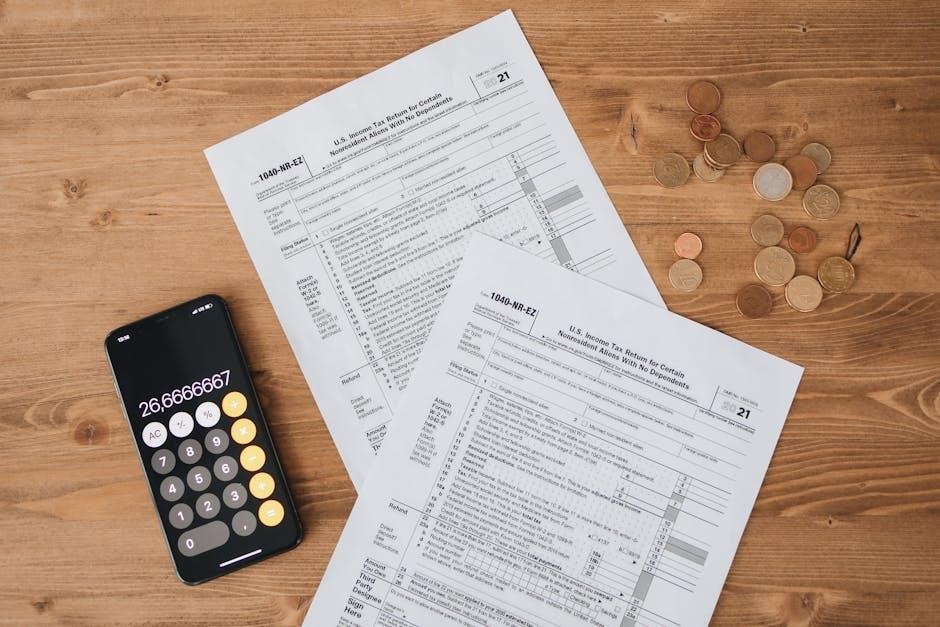Student self-reflection is crucial for growth, helping students address challenges and build resilience, especially after setbacks like failed assessments that can lead to self-doubt․
Our downloadable Student Self-Reflection Questions PDF provides structured prompts to enhance learning and personal development, empowering students to overcome obstacles and achieve academic success․
What is Student Self-Reflection?
Student self-reflection is an intentional process where learners evaluate their experiences, strengths, weaknesses, and goals․ It involves analyzing academic performance, personal growth, and social interactions to identify areas for improvement․
By engaging in self-reflection, students develop a deeper understanding of their learning styles and emotional responses, fostering self-awareness and accountability․ This practice encourages students to think critically about their achievements and challenges, helping them grow both academically and personally․
Tools like the Student Self-Reflection Questions PDF provide structured prompts to guide this process, enabling students to articulate their thoughts and feelings effectively․ Regular self-reflection empowers students to take ownership of their education and personal development․
Why is Self-Reflection Important for Students?
Self-reflection is essential for students as it helps them address challenges and setbacks, such as failed assessments, which can lead to self-doubt and low confidence․
By examining their experiences, students can identify areas for improvement, develop resilience, and build a growth mindset․
Reflective practices empower students to take ownership of their learning, set meaningful goals, and track progress;
Regular self-reflection fosters emotional intelligence, problem-solving skills, and a deeper understanding of their strengths and weaknesses․
Tools like the Student Self-Reflection Questions PDF provide structured prompts to guide students in overcoming obstacles and achieving academic success․

Benefits of Self-Reflection for Students
Self-reflection fosters resilience and improved academic performance by helping students identify strengths, weaknesses, and growth areas, addressing challenges like self-doubt from failed assessments․
Our Student Self-Reflection Questions PDF offers targeted prompts to guide this process effectively․
Improved Academic Performance
Self-reflection plays a vital role in enhancing academic performance by enabling students to identify their strengths, weaknesses, and areas for improvement․
By regularly examining their learning processes, students can address specific challenges, such as self-doubt and low confidence stemming from failed assessments․
This practice encourages students to analyze their study habits, set realistic goals, and develop strategies to overcome setbacks․
The Student Self-Reflection Questions PDF provides structured prompts to guide students in evaluating their progress, fostering a deeper understanding of their academic journey․
Through consistent self-reflection, students can refine their approaches to learning, leading to better grades and overall academic success․
Enhanced Critical Thinking Skills
Self-reflection significantly enhances critical thinking skills by encouraging students to analyze their learning experiences and problem-solving approaches․
By examining their thought processes, students develop the ability to evaluate information objectively and make informed decisions․
The Student Self-Reflection Questions PDF offers prompts that guide students in identifying patterns in their thinking and improving their analytical abilities․
Regular self-reflection helps students recognize biases, challenge assumptions, and approach problems from multiple perspectives․
This practice fosters intellectual curiosity and independence, enabling students to think critically in both academic and real-world scenarios․
Ultimately, enhanced critical thinking empowers students to navigate complex challenges with confidence and creativity․
Boosted Confidence and Self-Awareness
Self-reflection plays a vital role in building students’ confidence and self-awareness by helping them recognize their strengths and accomplishments․
By identifying areas of improvement, students gain a clearer understanding of their capabilities and potential․
The Student Self-Reflection Questions PDF provides guided prompts to explore personal growth and celebrate progress, fostering a positive self-image․
Reflecting on past challenges and successes empowers students to overcome self-doubt and develop resilience․
This practice also helps students acknowledge weaknesses without judgment, enabling them to address gaps in a constructive manner․
Enhanced self-awareness and confidence inspire students to take on new challenges and pursue their goals with determination and belief in their abilities․

Student Self-Reflection Questions for Academic Growth
Self-reflection helps students identify strengths and learning gaps, crucial for academic growth․ It addresses setbacks, builds resilience, and uses the PDF’s questions to guide improvement effectively․
Questions About Strengths and Weaknesses
Reflecting on strengths and weaknesses helps students understand their academic standing and personal growth․ These questions guide students to identify areas of excellence and improvement, fostering self-awareness․ By addressing setbacks, such as failed assessments, students can pinpoint where self-doubt arises and how it impacts their confidence․ The downloadable PDF provides structured prompts to help students evaluate their performance, recognize patterns, and develop strategies to overcome weaknesses․ This process empowers learners to build resilience and confidence, enabling them to approach challenges with a growth mindset․ Regular self-reflection on strengths and weaknesses ensures students stay focused on their goals and continuously improve their academic and personal skills․
Questions About Learning Experiences
Reflecting on learning experiences helps students evaluate their progress and identify areas for growth․ These questions encourage students to analyze what worked well and what didn’t, fostering a deeper understanding of their learning journey․ By examining specific experiences, students can recognize how challenges, such as failed assessments, have shaped their mindset and approach to learning․ The downloadable Student Self-Reflection Questions PDF includes prompts that guide students to think critically about their experiences, helping them uncover patterns and develop strategies to improve․ This reflection process empowers students to take ownership of their learning, build resilience, and approach future challenges with confidence and a growth-oriented perspective․
Questions About Goal Setting
Reflecting on goal setting helps students align their aspirations with actionable steps, fostering accountability and direction․ The Student Self-Reflection Questions PDF includes prompts that guide students to evaluate their goals, ensuring they are realistic and aligned with their values․ By examining past successes and setbacks, students can identify patterns in their motivation and persistence․ These questions encourage students to break down larger goals into manageable tasks and reflect on what drives their commitment․ Regularly assessing progress and adjusting strategies empowers students to stay focused and resilient, even when faced with challenges like academic setbacks․ Effective goal setting, supported by reflection, enables students to cultivate a growth mindset and achieve both personal and academic growth․
Self-Reflection Questions for Study Habits
Self-reflection questions help students assess their study habits, identify areas for improvement, and develop strategies for better time management and focus․
Our Student Self-Reflection Questions PDF provides prompts to evaluate study environments, learning strategies, and goal-setting practices, fostering resilience and academic success․

Evaluating Time Management Skills

Evaluating time management skills is essential for academic success․ Poor time management can lead to missed deadlines, increased stress, and lower grades․
Our Student Self-Reflection Questions PDF includes prompts like:
- How effectively do I allocate time for tasks and studying?
- What distractions prevent me from staying focused?
- How can I create a more balanced and realistic schedule?

These questions help students identify areas for improvement, set achievable goals, and develop better habits to manage their time wisely, reducing stress and improving overall performance․ Regular reflection on time management fosters accountability and helps students overcome challenges that hinder their academic progress․
Assessing Study Environments
Evaluating study environments is key to maximizing productivity and focus․ A conducive study space significantly impacts learning effectiveness and overall academic performance․
Our Student Self-Reflection Questions PDF includes prompts such as:
- Is my study area quiet, organized, and free from distractions?
- Does my environment support good posture and ergonomics?
- What tools or resources do I need to enhance my study space?
Reflecting on these aspects helps students identify areas for improvement, creating a more efficient and comfortable learning atmosphere․ By addressing environmental challenges, students can optimize their study habits and achieve better academic outcomes․ Regular assessment of study environments fosters a proactive approach to learning and personal growth․
Identifying Effective Learning Strategies
Reflecting on learning strategies helps students discover what works best for them, enhancing academic success and confidence․ The Student Self-Reflection Questions PDF guides students to explore:
- Which study techniques yield the best results?
- How can I adapt my methods to improve understanding?
- What resources or tools enhance my learning process?
By identifying strengths and areas for growth, students can refine their approaches, overcoming challenges like failed assessments that may lead to self-doubt․ Effective strategies not only boost performance but also foster resilience and a growth mindset․ Regular reflection empowers students to take charge of their learning journey, ensuring they are well-equipped to achieve their academic goals․ This proactive approach to education cultivates lifelong skills in adaptability and self-improvement․
Self-Reflection Questions for Social Interactions
Self-reflection questions help students evaluate their social interactions, fostering better communication and relationship-building skills․ The Student Self-Reflection Questions PDF offers prompts to explore these dynamics effectively․
Understanding Peer Relationships
Self-reflection helps students evaluate their interactions with peers, fostering empathy and stronger connections․ The Student Self-Reflection Questions PDF includes prompts to assess collaboration, communication, and conflict resolution․ By reflecting on peer relationships, students can identify behaviors that strengthen or hinder friendships, promoting a more supportive social environment․ These questions encourage students to consider how their actions impact others and how they can contribute positively to group dynamics․ Regular self-reflection on peer interactions can enhance teamwork, reduce misunderstandings, and build lasting relationships․ It also helps students recognize their role in fostering inclusivity and respect within their social circles․
Evaluating Group Work Experiences
Reflecting on group work experiences helps students analyze their contributions, strengths, and areas for improvement․ The Student Self-Reflection Questions PDF provides prompts to assess collaboration, communication, and problem-solving during group projects․ By evaluating these experiences, students can identify what worked well and what could be enhanced, fostering better teamwork and accountability․ Reflecting on group dynamics also helps students understand their role in achieving shared goals and how to address conflicts constructively․ These insights enable students to develop stronger interpersonal skills and approaches to future group work, ensuring more effective and harmonious collaborations․ Regular self-reflection on group experiences is essential for personal and collective growth in academic and real-world settings․
Reflecting on Communication Skills
Reflecting on communication skills is vital for students to understand their strengths and areas for improvement․ The Student Self-Reflection Questions PDF offers prompts to evaluate how effectively students convey ideas, listen actively, and adapt to different audiences․ By examining their communication styles, students can identify moments where they excelled or struggled, fostering self-awareness and growth․ Reflection also helps students consider how non-verbal cues, tone, and clarity impact their messages․ This process encourages students to refine their communication strategies, leading to stronger relationships and more effective collaboration in both academic and social settings; Regularly reflecting on communication skills empowers students to become more confident and articulate individuals, better equipped to navigate diverse interactions and challenges․

Overcoming Challenges Through Self-Reflection
Self-reflection helps students address academic setbacks, like failed assessments, which can lead to self-doubt and low confidence․ The Student Self-Reflection Questions PDF provides structured prompts to identify challenges, fostering resilience and problem-solving skills․ By reflecting on their experiences, students can build confidence, develop coping strategies, and improve future performance․ This process enables them to recognize areas needing improvement and seek support, ultimately enhancing their ability to overcome obstacles and achieve success․
Addressing Academic Setbacks
Academic setbacks, such as failed assessments, often lead to self-doubt and low confidence, hindering future performance․ Self-reflection helps students identify the root causes of these setbacks, enabling them to develop targeted strategies for improvement․ The Student Self-Reflection Questions PDF offers guided prompts to analyze failures, fostering a growth mindset and resilience․ By reflecting on their experiences, students can gain insights into areas needing improvement and adopt better study habits․ This process encourages them to seek support and implement changes, ultimately enhancing their ability to bounce back and achieve academic success․ Regular self-reflection not only addresses immediate challenges but also cultivates long-term problem-solving skills and confidence․
Building Resilience
Self-reflection is a powerful tool for building resilience in students, helping them navigate setbacks and challenges with confidence․ The Student Self-Reflection Questions PDF provides structured prompts to guide students in analyzing their experiences, identifying areas for growth, and developing coping strategies․ By reflecting on their challenges, students learn to reframe failures as opportunities for improvement, fostering a growth mindset․ Resilience is further strengthened as students gain insight into their emotional responses and develop problem-solving skills․ Regular self-reflection empowers students to adapt to difficulties, maintain motivation, and persist in achieving their goals․ This process not only enhances academic performance but also equips students with lifelong skills to handle adversity effectively․

Developing Problem-Solving Skills
Self-reflection plays a vital role in enhancing students’ problem-solving abilities by encouraging them to analyze challenges and explore solutions․ The Student Self-Reflection Questions PDF offers targeted prompts that guide students in evaluating their approaches to obstacles, identifying mistakes, and learning from them․ By reflecting on their experiences, students gain a deeper understanding of how to break down complex problems into manageable parts․ This process fosters critical thinking and creativity, enabling students to develop innovative solutions․ Regular self-reflection also helps students refine their decision-making skills, allowing them to approach challenges with confidence and a proactive mindset․ Over time, this practice equips students with the resilience and adaptability needed to tackle real-world problems effectively, both in academia and beyond․
Student self-reflection fosters resilience and confidence, helping students overcome setbacks like failed assessments․ Our Student Self-Reflection Questions PDF provides structured prompts for personal and academic growth, ensuring continued progress and success․
Student self-reflection is a powerful tool for personal and academic growth, enabling students to identify strengths, address weaknesses, and develop resilience․
The Student Self-Reflection Questions PDF offers structured prompts to guide learners in evaluating their learning experiences, goal-setting, and study habits․
By fostering critical thinking and self-awareness, self-reflection helps students overcome challenges, such as academic setbacks, and build confidence․
Regular self-reflection empowers students to take ownership of their education and develop problem-solving skills, leading to improved academic performance and lifelong learning․
This resource is essential for students seeking to enhance their educational journey and achieve their full potential․
Encouraging Regular Self-Reflection
Regular self-reflection is essential for fostering a growth mindset and resilience in students․
Educators and parents can encourage this practice by integrating reflection into daily or weekly routines, such as dedicating time at the end of each day or week for students to jot down their thoughts․
The Student Self-Reflection Questions PDF serves as a valuable resource, offering prompts that guide students in identifying strengths, areas for improvement, and goals․
By consistently practicing self-reflection, students develop a deeper understanding of their learning processes and emotional growth, ultimately enhancing their academic success and personal development․
Making reflection a habit empowers students to take ownership of their education and thrive in all aspects of life․

Additional Resources
Download the Student Self-Reflection Questions PDF for guided prompts and templates․ Explore online tools and worksheets to support reflective practices and streamline self-assessment processes effectively․

DOWNLOADABLE STUDENT SELF-REFLECTION QUESTIONS PDF
Enhance your self-reflection journey with our Student Self-Reflection Questions PDF․ This comprehensive guide offers thought-provoking prompts tailored for students, covering strengths, weaknesses, learning experiences, and goal setting․ Perfect for personal growth and academic improvement, this downloadable resource provides structured templates to help you gain deeper insights into your learning process․ Whether you’re looking to improve study habits, build confidence, or develop problem-solving skills, this PDF is an invaluable tool․ Download it now and start reflecting effectively to unlock your full potential․ The PDF is free, easy to access, and designed to support your educational and personal development journey․










